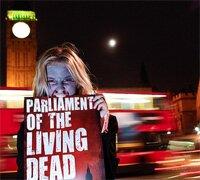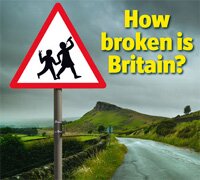Bank rescue plan: will it work?
And the $64,000 dollar question– if such a trifling sum can stand metaphorical duty in this context – is whether the government’s bank rescue plan is going to work.
At one level, it bloody well better do; ‘failure is not an option’ may be one of the worst clichés of modern management-speak, but just for once, this assertion is unquestionably true.
Moreover, I still have yet to see any obviously superior or even radically different ideas coming from commentators linked to the Conservatives, the Liberal Democrats or the even the hard left. So this is what we are going to get.
Most of the analysis I have seen this morning seems to suggest the plan is in with a shout of achieving its immediate aims. The collapse of a major British bank is unlikely in the short term, and as a result, credit markets will not freeze up entirely. Some form of lending to both businesses and consumers will continue.
In terms of the wider impact outside the Square Mile, the main political question becomes the one highlight by the Daily Mail, with its finely-honed deft populism, in its leader this morning: ‘What do WE get for our blank cheque?’
That’s a good question, especially as the blank cheque works out at around £2,000 per taxpayer. Let’s start by looking at how good this deal is for those forced to contribute to the whipround.
Essentially, the state will receive minority preference shareholdings in seven banks and one building society, in return for the £50bn needed to prop them up.
Doing things this way is a presentational plus point; Labour will be able to make the argument to the electorate that this isn’t a ‘something for nothing’ deal, because the government is getting an equity stake in the banks it assists.
But preference shares have both pros and cons. They are safer than ordinary shares, in that they earn a set dividend which must be paid before any other shareholders get a dividend. Hence the name.
If for any reason this dividend is not paid, then it is carried forward to the next year, again taking preference over dividends on ordinary shares.
Yet their very safeness precludes their holders from benefiting from the increasing dividends that ordinary shareholders typically enjoy as profits rise.
In other words, precisely because they minimise risks, they therefore do not maximise income. Accordingly, the guess has to be that low risk is part of the attraction here.
Preference shares do not carry voting rights, either. Labour will sell this point as a guarantee that there will be no ‘political interference’ in what will remain private sector concerns, thereby averting charges of wilful Old Labourism.
This is regrettable, on point of democratic principle alone. If public money is being forced to pick up the pieces, then the public should surely get a say in the way the beneficiaries operate in future.
Part of the problem over the last period has been the way in which bank bosses have concentrated on trousering bonuses, while disregarding any obligation to act in the wider social interest.
Taking and using a voting stake in the major financial institutions would be one way of ensuring this does not happen again. At the very least, it would enable the government to enforce responsible remuneration, rather than simply urge virtue from the sidelines.
It’s also worth noting that some preference shares are ‘convertible preference’ share, which can ultimately be converted to ordinary shares; astonishingly, it is not yet clear if this is the case in the Darling deal.
The argument for convertibles is that once the years of downturn that stretch out ahead of us are over, share prices could start to rise rapidly once again; converting the preference shares would then allow the state to share in the upside. If it turns out this option is not open, there had better be a good explanation as to why.
In short, this is not a deal that is going to make anybody fall in love with it; the free market right will find much that is offensive, and the social market left will find it unnecessarily timid.
Partial socialisation of the banking system is not a bad thing in itself. It’s just that it could have been handled so much better if the idea had been developed as part of a carefully considered strategy for greater economic democracy, rather than a hastily put together panic measure with a number of obvious drawbacks.
-------------------------
Share this article
| Post to del.icio.us | Tweet |
Dave Osler is a regular contributor. He is a British journalist and author, ex-punk and ex-Trot. Also at: Dave's Part
· Other posts by Dave Osler
Filed under
Blog ,Economy
4 responses in total ||
Taking on extra risk in an attempt to maximise income sounds like the sort of thing those greedy bankers would do; I’m not sure why you regret the state not doing it. If the near-future for the banks involves them paying no dividend to ordinary shareholders, as they struggle to recapitalise themselves from operating cashflow, prefs are going to look like a good idea I think. You might be interested in commentary on Brown’s plan from across the pond
oh, looks like I messed up the link – here it is:
http://krugman.blogs.nytimes.com/2008/10/08/to-do-not-to-do/
“The free market right will find much that is offensive, and the social market left will find it unnecessarily timid.”
Doesn’t that make it likely to be quite a good plan, altogether?
The untold story so far is the state of the derivatives market (nominally valued at half a quadrillion and counting), of which the sub-prime collapse is merely an effect.
If that house of cards starts to fall – with leverage levels at 100x plus, then this capitalisation is going to look like small change.
Gulp…
Reactions: Twitter, blogs
Sorry, the comment form is closed at this time.
You can read articles through the front page, via Twitter or rss feeds.
» Malcolm X backs Tory schools plan
» Another big setback for the global warming deniers
» Why Nick Clegg’s attempts to redefine ‘fairness’ don’t stack up
» Ed Balls slams Coalition with alternative approach to cuts
» Sanity, liberalism and hypocrisy. And MORE BOOZE!
» How your money is destroying our environment through RBS
» The contradiction at the heart of David Miliband’s campaign
» How does Cruddas endorsement for David M change things?
» Claudy bombing: answers, please
» Why a ban on ‘dangerous dogs’ doesn’t work
» How the Cancer Drug Fund is being used to attack the NHS
|
4 Comments 17 Comments 27 Comments 6 Comments 23 Comments 26 Comments 11 Comments 24 Comments 30 Comments 27 Comments |
LATEST COMMENTS » pagar posted on Increasing benefits helps people get jobs » pagar posted on Sanity, liberalism and hypocrisy. And MORE BOOZE! » K C FONG posted on Women's group needs help for acid victims » Joshua Seymour posted on How your money is destroying our environment through RBS » tim f posted on Dirty tricks against Yes2AV campaign begin! » Fred Z posted on Sanity, liberalism and hypocrisy. And MORE BOOZE! » Matt Munro posted on Another big setback for the global warming deniers » Wayne Weeks posted on Increasing benefits helps people get jobs » Matt Munro posted on Another big setback for the global warming deniers » Charles Knight posted on Increasing benefits helps people get jobs » Richard Walthers posted on Increasing benefits helps people get jobs » Joshua Seymour posted on How your money is destroying our environment through RBS » Bob B posted on Increasing benefits helps people get jobs » Falco posted on Another big setback for the global warming deniers » Falco posted on Increasing benefits helps people get jobs |














